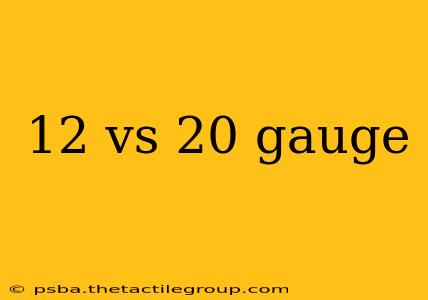Choosing between a 12-gauge and a 20-gauge shotgun is a common dilemma for both novice and experienced shooters. The decision hinges on several factors, including intended use, physical capabilities, and personal preference. This comprehensive guide breaks down the key differences to help you make the informed choice.
Understanding Gauge: A Quick Primer
Before diving into the specifics, let's clarify what "gauge" means. Gauge refers to the diameter of the shotgun barrel. The higher the number (e.g., 20 gauge), the smaller the diameter. A 12-gauge shotgun has a larger bore than a 20-gauge, meaning it can accommodate larger shot charges.
12 Gauge: The Workhorse
The 12-gauge shotgun is the undisputed king of the shotgun world. Its popularity stems from its versatility and power.
Advantages of a 12 Gauge:
- Power and Range: The larger bore allows for significantly more powerful shots, offering greater range and stopping power, particularly crucial for hunting larger game.
- Wide Availability of Ammunition: You'll find 12-gauge ammunition virtually everywhere, from big-box stores to specialized sporting goods shops. The sheer volume of options allows for easy access to various loads tailored to specific needs.
- Versatility: 12-gauge shotguns can be used for a vast array of purposes, including hunting various game, sport shooting (clay pigeons, trap, skeet), and home defense.
Disadvantages of a 12 Gauge:
- Recoil: The substantial power translates to significant recoil, which can be challenging for new shooters or those with less upper body strength. This can lead to fatigue and discomfort, especially during extended shooting sessions.
- Weight: 12-gauge shotguns tend to be heavier than their 20-gauge counterparts, making them less maneuverable and more cumbersome to carry.
- Cost: While ammunition is widely available, the sheer volume used can make it a more expensive option over time compared to the 20-gauge.
20 Gauge: The Lightweight Contender
The 20-gauge shotgun offers a compelling alternative for those seeking a lighter, more manageable firearm.
Advantages of a 20 Gauge:
- Reduced Recoil: The smaller bore results in considerably less recoil, making it a more comfortable and enjoyable shooting experience, especially for beginners or smaller-framed individuals.
- Lighter Weight: Its lighter weight enhances maneuverability and reduces fatigue during extended shooting sessions. This is a significant advantage for hunters who spend hours in the field.
- Improved Shoulder Comfort: The lower recoil translates to greater shoulder comfort, especially during high-volume shooting.
Disadvantages of a 20 Gauge:
- Less Power: Compared to a 12-gauge, the 20-gauge delivers less stopping power and a shorter effective range. This may limit its effectiveness for hunting larger game.
- Ammunition Availability: While readily available, the selection of ammunition types is generally less extensive than that of the 12-gauge.
- Cost-per-round can be higher: Although individual shells might be cheaper, the reduced power might mean you need more shells to achieve the same result, potentially increasing the overall cost.
The Verdict: Which Gauge is Right for You?
The "best" gauge depends entirely on your individual needs and preferences.
-
Choose a 12-gauge if: You need maximum power and range, hunt larger game, prioritize ammunition availability, and don't mind the recoil.
-
Choose a 20-gauge if: You prioritize reduced recoil and lighter weight, are a new shooter, have a smaller frame, or primarily hunt smaller game.
Ultimately, the best approach is to handle both gauges and determine which feels more comfortable and suits your shooting style. Consider renting or borrowing both before making a purchase. Don't hesitate to consult with experienced shooters or professionals at your local gun store for personalized advice.

